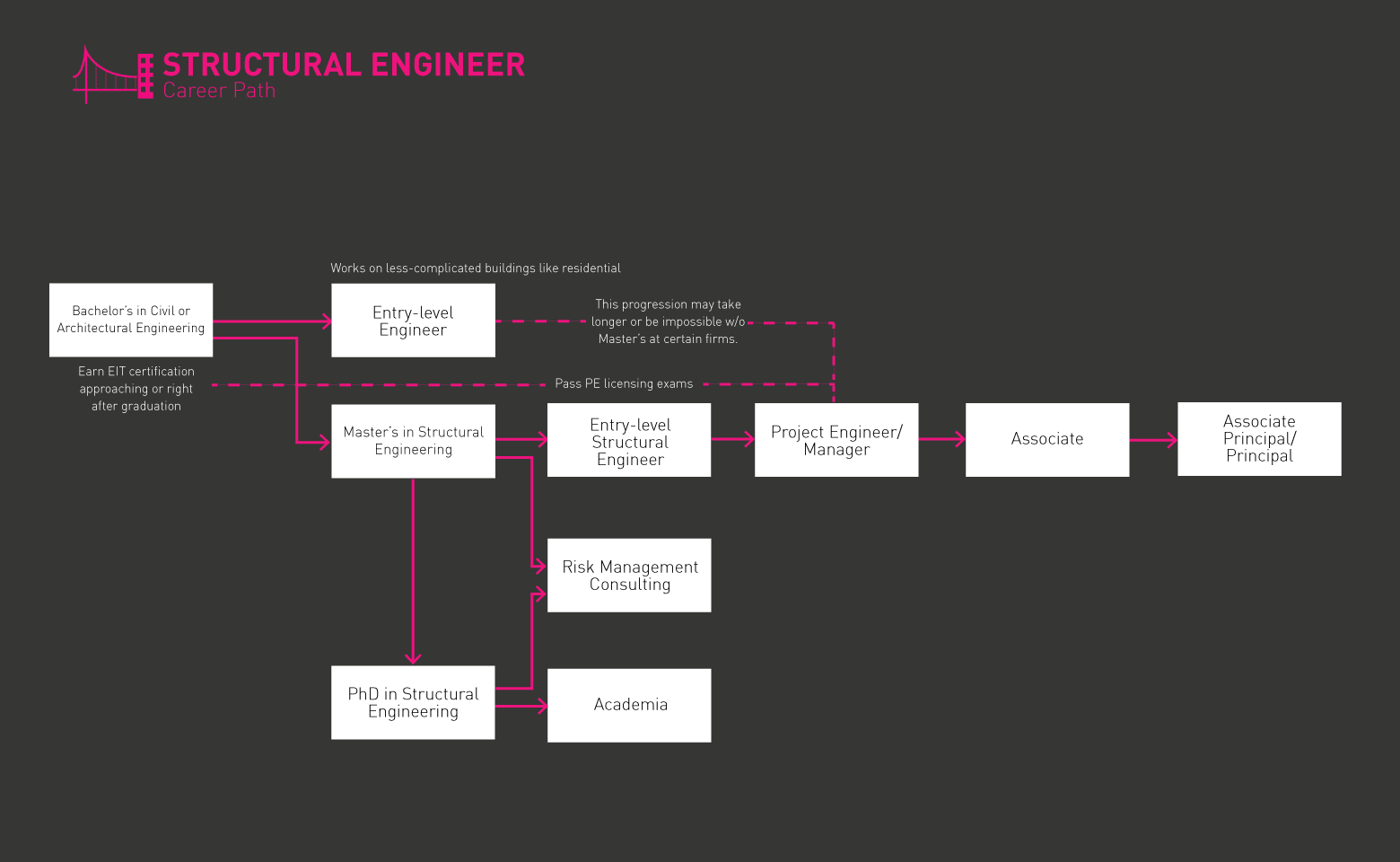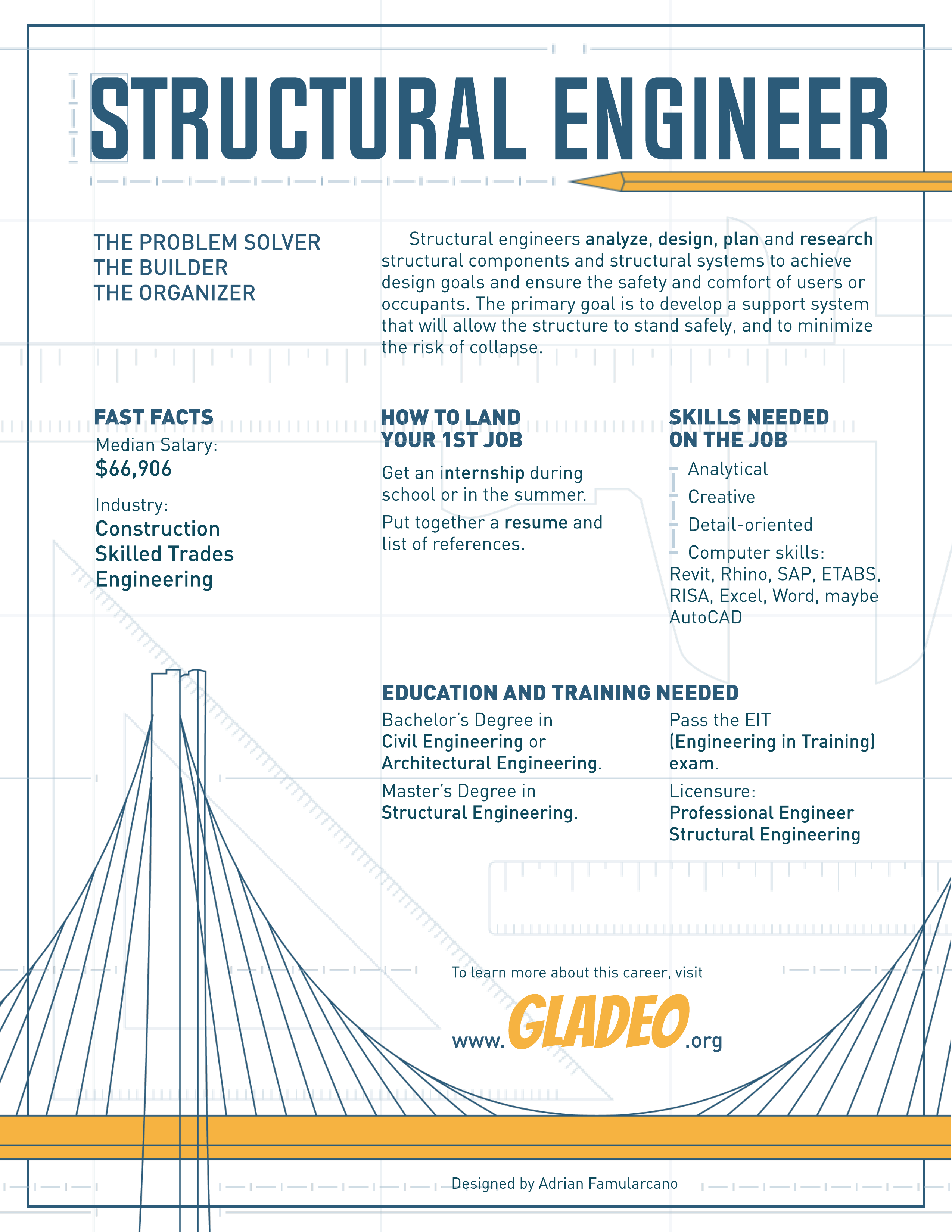Spotlights
Civil Engineer (Structural), Structural Design Engineer, Bridge Engineer, Building Engineer (Structural), Structural Analysis Engineer, Construction Engineer (Structural), Seismic Engineer, Steel Structures Engineer, Concrete Structures Engineer, Structural Integrity Engineer
Structural engineers analyze, design, plan and research structural components and structural systems to achieve design goals and ensure the safety and comfort of users or occupants. The primary goal is to develop a support system that will allow the structure to stand safely, and to minimize the risk of collapse.
“Structural engineers must be very detail-oriented and systematic in how they solve problems. They often get ambitious designs from architects and must figure out how to make the structures stand while staying true to their design intent. Sometimes the work can be tedious, but figuring out a design solution and seeing the project become built makes the hard work well worth the effort.” Christina Cho Yoo, Professional Engineer
“You may be running building system analysis programs on the computer or doing structural calculations. Sometimes you are required to draw out detail connections or systems. You may also be meeting up with architects and other engineering consultants to coordinate your drawings with theirs. During construction, once in awhile you may be going to inspect how things are going at the building site.” Christina Cho Yoo, Professional Engineer
- Analytical
- Creative
- Detail-oriented
- Computer skills: Revit, Rhino, SAP, ETABS, RISA, Excel, Word, maybe AutoCAD
- Engineering firm
- Government entity
- Research or consulting firm
Structural sustainable design, computational geometry, façade engineering, digital fabrication, building information modeling
- Enjoyed building and organizing things.
- Tried to figure out how to fix things.
- Enjoyed drawing.
- Enjoyed math and science.
- Structural Engineers are a type of Civil Engineer. They usually need a bachelor’s in civil engineering or civil engineering technology from an ABET-accredited engineering program
- A master’s isn’t needed but can help qualify you for advanced positions and higher wages
- Per O*Net, 86% of all Civil Engineers have a bachelor’s, 10% a master’s, and 5% have a post-baccalaureate certificate
- Entry-level workers don’t need a license, but many opt to complete a Professional Engineering (PE) licensure program so they can become licensed Professional Engineers able to “oversee the work of other engineers, sign off on projects, and provide services directly to the public”
- Each state has different licensing requirements. Candidates may need to first take a Fundamentals of Engineering (FE) exam, become an Engineer in Training or Engineer Intern, then later take their Principles and Practice of Engineering (PE) exam
- Additional certifications can bolster your credentials. These include:
- Academy of Coastal, Ocean, Port & Navigation Engineers
- Diplomate, Ocean Engineering
- Diplomate, Navigation Engineering
- Diplomate, Port Engineering
- Academy of Geo-Professionals - Diplomate, Geotechnical Engineering
- American Academy of Project Management - Certified Planning Engineer
- American Hospital Association - Certified Healthcare Constructor
- American Public Works Association - Certified Public Infrastructure Inspector
- American Society of Heating, Refrigerating and Air-Conditioning Engineers - Certified HVAC Designer
- Association of Energy Engineers -
- Certified Building Commissioning Professional
- Certified Building Energy Simulation Analyst
- Certified Energy Procurement Professional
- Certified Measurement and Verification Professional
- Distributed Generation Certified Professional
- Construction Specifications Institute - Certified Construction Contract Administrator
- Golf Course Builders Association of America - Certified Golf Course Builder
- Green Business Certification Inc. - LEED AP Neighborhood Development
- International Fluid Power Society - Fluid Power Connector and Conductor
- National Council of Building Design Certification - Certified Professional Building Designer
- National Ground Water Association - Certified Ground Water Professional
- Society of American Value Engineers -
- Certified Value Specialist
- Value Methodology Associate Certification
- Academy of Coastal, Ocean, Port & Navigation Engineers
Is the school focused on research or practicum? Theory or design?
MIT, Stanford, UC-Berkeley, Imperial, Caltech, ETH Zurich, UCLA, UT-Austin, Cornell
- Stock up on courses in physics, calculus, statistics, algebra, geometry, linear optimizations, statistics, science, engineering, finance, production systems planning, manufacturing systems, English, and writing
- Gain practical work experience through Structural Engineer internships
- Volunteer for school activities where you can practice teamwork and collaboration skills
- Technology and software to become familiar with include:
- Adobe Fireworks
- Computer-aided design software
- Development environment software
- Document management software
- Enterprise resource planning software
- Extensible markup language
- File versioning software
- Geographic information system
- MathWorks MATLAB
- Oracle Business Intelligence Enterprise Edition
- Project management software
- Supervisory control and data acquisition
- Read articles and watch tutorials about Structural Engineering to learn from insiders
- Try to schedule an Structural Engineer informational interview to ask questions
- Get specialized with an in-demand certification
- Join professional organizations to learn, grow, and network (see our Recommended Resources > Websites for a list of options)

- Structural Engineer internships are a great way to get started
- List any certifications you have on your resume (if you’re working on a professional license, list that, too)
- Sign up for alerts on job portals such as Indeed, Simply Hired, Glassdoor, and Zippia
- There are also several engineering-specific job boards, such as National Society of Professional Engineers, EngineeringJobs.net, IEEE Job Site, Society of Women Engineers, ASCE Career Connections, Society of Hispanic Professional Engineers, American Council of Engineering Companies, C&ENjobs, ASHRAE Jobs, and Tau Beta Pi The Engineering Honor Society
- Talk with your school career center for help with resumes, mock interviews, and job fair dates and locations
- Let your LinkedIn network know you are looking for a job!
- Ask former professors, supervisors, and co-workers to vouch for you as personal references
- Review Structural Engineer resume templates to get fresh ideas
- Study Structural Engineer interview questions to prep for interviews
- Take time to learn how to dress for interview success
- After interviews, jot down notes so you can learn and improve
Magazines: Structure, American Society of Civil Engineers (ASCE)
Professional organizations: EERI, Structural Engineers Association – International (SEAINT) or your local chapter
Websites
- Accreditation Board for Engineering and Technology
- American Concrete Institute
- American Congress of Surveying and Mapping
- American Council of Engineering Companies
- American Public Works Association
- American Society for Engineering Education
- American Society of Civil Engineers
- American Water Works Association
- ASTM International
- Earthquake Engineering Research Institute
Books
- Fundamentals of Structural Engineering, by Jerome J. Connor and Susan Faraji
- Residential Structural Design Guide, Second Edition: A State-of-the-Art Engineering Resource for Light-Frame Homes, Apartments, and Townhouses, by Coulbourne Consulting
- Structural Engineering Handbook, by Mustafa Mahamid, Edwin Gaylord, et al.
- Key transferable skills: Organized, systematic problem solving; knowing how to make things stand up and stable.
- Alternate careers: Architect, contractor, patent lawyer, finance – quantitative analysis
Newsfeed

Featured Jobs

Online Courses and Tools









